Feelings and emotions, not facts and thoughts, create epic radio content. How Germany’s #1 station achieved a huge radio ratings growth through storytelling.
Program director Valerie Weber of Germany’s top radio brand ANTENNE BAYERN shared at Radiodays Europe 2013 how storytelling enabled them to increase their average hour reach by 30% in 1 year, and why radio is more than image values and program formats. “Good stories are the glue that can keep your listeners loyal for a long time.”
“The worst thing was this multiple trauma break –
right at the top of the hour”
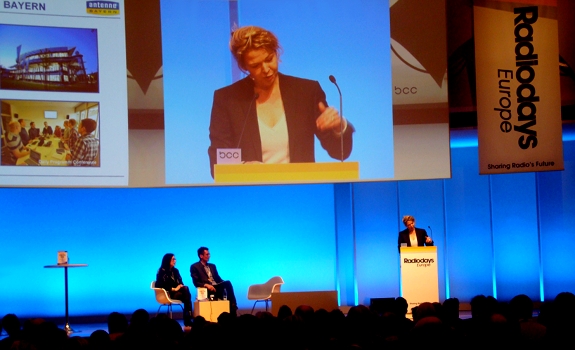
ANTENNE BAYERN PD/GM Valerie Weber (standing on stage, with on the left side: radio consultant Valerie Geller and the session host) recalls that their news bulletins used to include a lot of negative content (photo: Thomas Giger)
Avoid over-formatting your station
After many years of having over 1 million listeners per average hour, ANTENNE BAYERN experienced a ratings decline in 2011 where they suddenly bubbled under that magic number. What makes it interesting is that the station, in the market since 1988, still had perfect images. People still thought that they had the best music mix, the best radio personalities, the most reliable news service, and so on. “Neither we, nor listeners in focus groups, nor market researchers could tell us what we were doing wrong”, program director Valerie Weber (who is also general manager of the station) recalls. “Maybe we were just too perfect? It makes every radio station boring.”
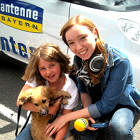 Focus on developing stories
Focus on developing stories
She met up with German media consultant Uwe Walter, who was ruthless in a good way – stating that many radio stations don’t see the possibilities of their medium. “Perhaps we had been too busy perfecting our format”, Weber says in retrospective. She knows that unlike television, where most of the content is preproduced, radio has “the challenge to create everything from scratch, and to tell stories live as they happen”.
Offer balanced news coverage
Her consultant noticed that all day long, ANTENNE BAYERN was telling sad stories, based upon the old school journalism principle that only bad news is good news. “Usually without a happy end, and usually pretty boring as well”, Valerie Weber frankly admits in a room full of colleagues. “The worst thing, he told us, was this multiple trauma break – this list of disasters, right at the top of the hour. He was right: if your radio wants to be your friend, why does it only give you bad news? All we were really doing was counting the number of dead bodies; we never paid any attention to the lucky survivors.”
“Every good story needs a hero”
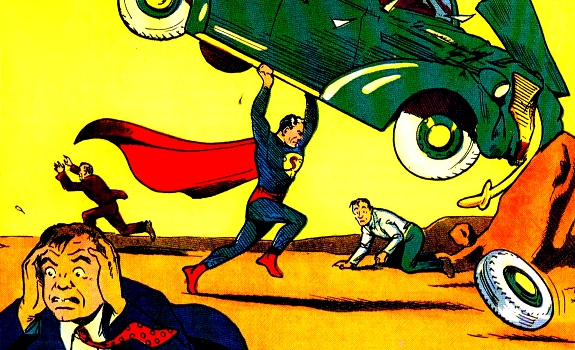
ANTENNE BAYERN does a lot of storytelling from the perspective of a key character in the middle of what happens – like the hero figure in a comic, who follows a call to adventure and starts a heroic journey (image: Hulton Archive)
Give your brand ‘soul’
Weber feels that stories have always been there: “It’s just that we often don’t see them, or tell them the wrong way”. In her opinion, program directors and news editors should look further that the format when deciding which stories to tell, how to do it, and where to schedule them. It is also about the atmosphere on the air: “It’s soul. It’s mood management.” She explains that ANTENNE BAYERN (Modern AC for 14-49 year-olds) wants to appeal to traditional values and regional pride, and to look at the world optimistically. Together with Broadcast Programming & Research, they came up with a positive positioning statement: ‘Wir lieben Bayern, wir lieben Musik’ (‘We love Bavaria, we love music’). “It’s our promise to our listener, but we also have to tell this love story on the air.”
 Keep glass half full
Keep glass half full
It’s one of the reasons why they decided to move away from just repeating news delivered by press agencies. “We really make sure that we’ll also tell happy stories in which everything went well. There was not an accident on the motorway, because somebody stopped it from happening. We tell the story of Bavarian doctors who managed to save someone’s life, instead of just listing the number of people killed on the roads. Life is more than just bad luck.”
Tell real-time, open-ended stories
Another difference in approach of ANTENNE BAYERN is their storytelling perspective. Where newspapers and TV cover what already has happened, radio can focus on real-time storytelling (with an open ending). Consequently, relying on press agencies for news has even more disadvantages. Their content usually is being delivered “too late” for radio and is “already complete” – thus missing the essential part of the story, which Weber refers to as “the moment of decision”. She thinks that radio people could learn from how screenplay writers build a drama. “Every good story needs a hero. There’s a call to adventure; a challenge that the hero sets for himself. We can follow this heroic journey in real time.”
“Every bill has a story”

Valerie Weber makes clear that the journey (the story behind the bill) is more important than the destination (the giveaway of the money) in the radio promotion We Pay Your Bills (images: ANTENNE BAYERN, 102.7 KIIS FM)
Look for interesting personalities
Every day after the morning show, all of the radio station’s department heads meet up to work out the plot for that day’s stories – for which they select the most compelling character as key player in your news story. When ANTENNE BAYERN covered the Biathlon World Championships 2012 in Bavaria, they were not necessarily looking for fastest biathlete – let alone just summing up the winners of the games. Instead, they looked for the one contestant with the most moving personal story, thus creating a mix of documentary and soap opera. But there is more than just news and events to create stationality through storytelling – as the average music station plays about 12 songs an hour.
 Play meaningful, well-written songs
Play meaningful, well-written songs
“The system used for your musical storytelling is normally Selector or Music Master. But you can highlight some of these stories”, program director Valerie Weber says about songs that actually have someting to say. Her idea is that you can let music help you bond with listeners if it addresses a universal topic like a lost love, mentioning singer/songwriter Adele’s Someone Like You as a track that connects on the emotional level.
Integrate storytelling in promotions
Apart from ANTENNE BAYERN’s news selection and music playlist, Valerie Weber always tries to make sure that on-air promotions contribute something positive to the brand. “During the last year, we have been running a promotion that promotes storytelling: We Pay Your Bills.” Many radio stations in Germany – and all over the world, for that matter – are still using it. Although it’s not original, it still works in many radio markets. Weber knows, why: “Every bill has a story. ‘Tell us the story behind your bill, and we will pay it for you.’ The 300 Euro taxi fair, the bill for a plumber on New Year’s Eve, or a fee for a private detective.”
“Feelings and emotions are
far more important on the radio than facts”
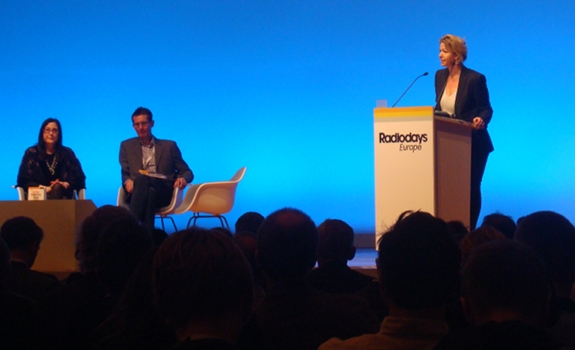
Program director Valerie Weber knows that good storytelling results in loyal listenership, which helped ANTENNE BAYERN to achieve a massive radio ratings growth in a short amount of time (photo: Thomas Giger)
Share smaller stories, too
They find inspiration for human interest content through online crowd sourcing on forums and Facebook (“somebody who lost his dog on a train and calls us for help”) or even in that good-old newspaper. During the Oktoberfest of 2012, their morning show’s weather girl found a newspaper ad in which a supermarket chain had a traditional Bavarian female dress for sale, for just 49 Euros. So after the show, she drove off on a treasure hunt to get one. During the whole day, listeners of ANTENNE BAYERN were able to follow this simple everyday adventure – from trying to find a parking space at the supermarket to locating this thing inside the store (“maybe behind the banana boxes?”) to telling the audience how this cheap dress feels after putting it on. In other words: if you let the listener be an eyewitness that can work really well.
 Make radio sound human
Make radio sound human
“This is radio; this is entertainment; this is real time”, Valerie Weber sums up the benefits. Her impression is that storytelling helped ANTENNE BAYERN to grow their listenership 30% in 1 year. They went from 1 to 1.3 million listeners per average hour, reinforcing their position of Germany’s top station. “Feelings and emotions are far more important on the radio than facts, and good stories are the glue that can keep your listeners loyal for a long time.”

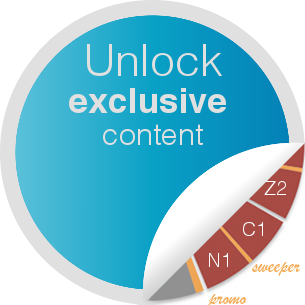



I absolutely agree with this report. I am wondering for a long time already, why news editors are still convinced that ‘only bad news is good news’.
Of course, you have to get people informed about news, but to be honest: not all bad news has to be transmitted instead of giving a positive example.
In my opinion, it is the responsability of editors to start rethinking – and give ‘a glass of program’ half full, instead of half empty.
Valerie Weber is absolutely right: no other medium benefits more from well-done storytelling than radio. And yes: (not just) radio journalists have to learn to talk not only about bad news. As radio is a companion through the day, we need to talk about things that make life worth living – and social media surveys confirm that people like to hear good news from daily life.
Nevertheless, Valerie Weber’s station ANTENNE BAYERN has an interesting way of doing this on a day-to-day basis. Their presenters, for example, NEVER talk about any bad news. In case of accidents or political crises they (are told to?) rather make neutral announcements and only use stereotype, unemotional wordings before their colleagues from the news department speak about the ‘bad news’ (if at all). As a result in the long run, ANTENNE BAYERN’s personalities may be seen as ‘fun puppets’ and ‘feel good guys’ – and therefore as unreal as they were in the format-period.
Of course: at the moment the success is on Valerie Weber’s side. But isn’t this radical way of creating ‘feel good’ radio in fact the SAME kind of mistake as the radical way of formatting that they made before? What about bringing back REALLY natural human beings into radio? People, who act like normal people? Sometimes moved by a ‘bad news’ tragedy, sometimes grinning about a ‘good news’ story? With actual time to tell these stories, and producers to make them really good?
Regarding Valerie Weber’s example of promotion storytelling: her extolled game ‘We Pay Your Bills’ (as well as other games on the station) is under reasonable suspicion to have worked not only with good storytelling, but also with actual storyMAKING. Several of these games – not only on ANTENNE BAYERN – ‘coincidentally’ ended with alleged scandals that have been keeping their listeners busy for days. And all of these ‘scandal stories’ happened during the survey period for the German radio ratings. These stations benefit from stories that draw public attention, especially in social networks.
In my opinion, this is the negative side of a radical storytelling concept. There should be no falling from one extreme into the other. Or, to make a long story short: thank God for the end of extreme formatting. But beware of extreme storytelling!
Links to related articles of the initiative ‘fair radio’, which calls for credible radio, in German language:
Ein Wicht(el), wer Böses dabei denkt
Geht’s auch weniger pathetisch?